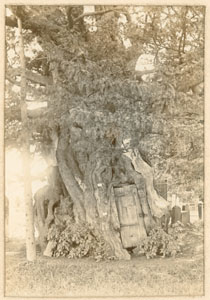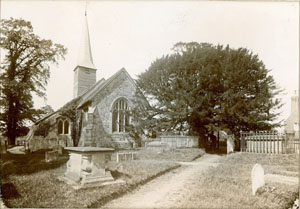Almost every churchyard throughout the kingdom, as my opening line states, had a Yew tree, in its Christian context the Yew is a symbol of resurrection but further back in time it was a symbol of regeneration. Our Celtic history saw our ancestors worship such trees, making offerings to them because these trees were the home of spirits or divinities who had power over life.
The yew it seems, can regrow long after our ancestors turned it into beams built into their houses and, like the Crowhurst Yew,
after it stood the ravages of civil war.
What of this wondrous old Yew now?
It seems that much of it is dead or in a delicate state but what remains is complex and beautiful, but what stories it could tell if only it could speak.



 RSS Feed
RSS Feed
